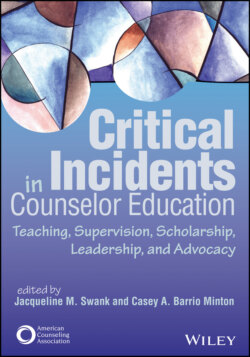Читать книгу Critical Incidents in Counselor Education - Группа авторов - Страница 69
Balancing Student Needs
ОглавлениеCounselor educators must promote the cultural competence of counseling students (American Counseling Association, 2014, Standard F.11.c.). Too often discussions of diversity are focused on the learning of naive and privileged students, like Anne and Chris, and do not attend to the educational growth of students from marginalized backgrounds, as Bell asserted during office hours.
Naive students lack experience with diverse communities. It is not that they are actively biased or hateful; they merely endorse dominant ideology out of lack of active consideration (Hipolito-Delgado, 2009). Privileged students have unearned advantages based on a dominant identity; this bestows a sense of entitlement, a lack of identity, and freedom to ignore the other. Because privilege is bestowed and viewed as a lack of identity, it can be hard for students to see how they benefit from social inequity, leading to rugged individualism and the belief that meritocracy is valid. It is helpful to remember that bias among naive and privileged students can be the product of generalization based on limited information. Thus, these students might not actively endorse biased beliefs; they merely have not taken the time to question them. Faculty members can use instructional strategies to promote questioning to inspire students to reexamine their beliefs. Professor Malcom did this to some extent; however, he missed helping Anne question whether assimilation is the desired goal for ethnic communities. What is it in Anne’s experience that leads her to believe that a loss of one’s home culture in favor of U.S. culture is best?
Students from marginalized communities are often frustrated by their experiences in multicultural counseling courses and typically do not experience gains in multicultural competence from such courses (Chao et al., 2011). Perhaps this is because students of color feel tokenized, as if they are expected to educate their more privileged peers (C. A. Baker et al., 2015). Like Bell, students of color describe frustrations with surface-level discussions of diversity, desiring more depth and breadth (Seward, 2014). To engage students from marginalized communities, Hipolito-Delgado et al. (2017) called for counselor education faculty to broach differences in ways that foster a sense of inclusion.
To promote the learning of students from marginalized communities, it is helpful to include considerations of sociopolitical power and oppression. This moves discourse beyond cultural values and difference and toward the social construction of power and privilege and the perpetuation of oppression through education, politics, and culture. This approach can promote the sociopolitical development of all students, increasing their critical consciousness and the need for social action to facilitate the liberation of oppressed communities. For students like Chris, this will clarify the fact that multicultural counseling is not simply about respecting opinions but about being an advocate for social justice.
